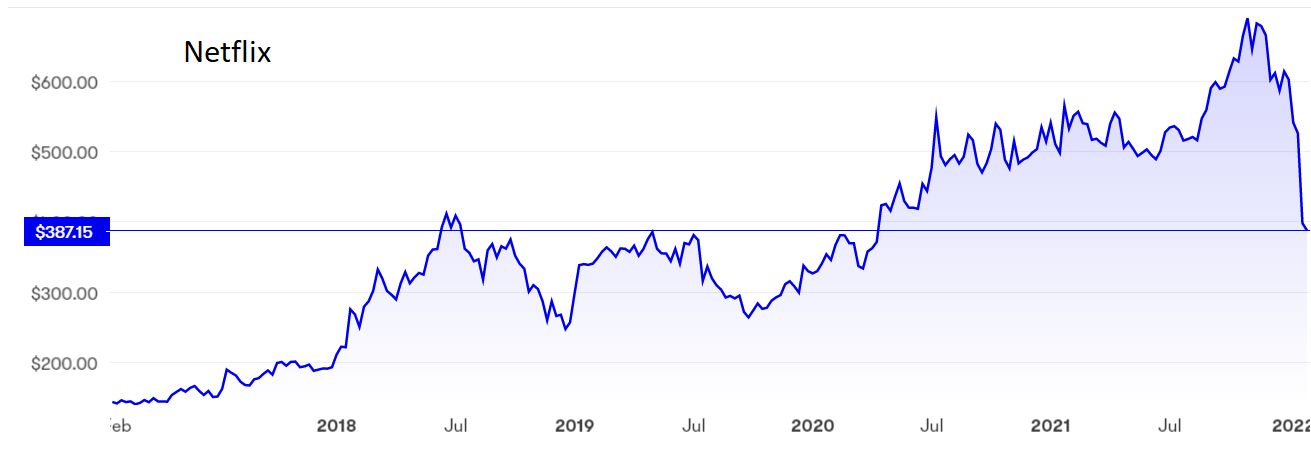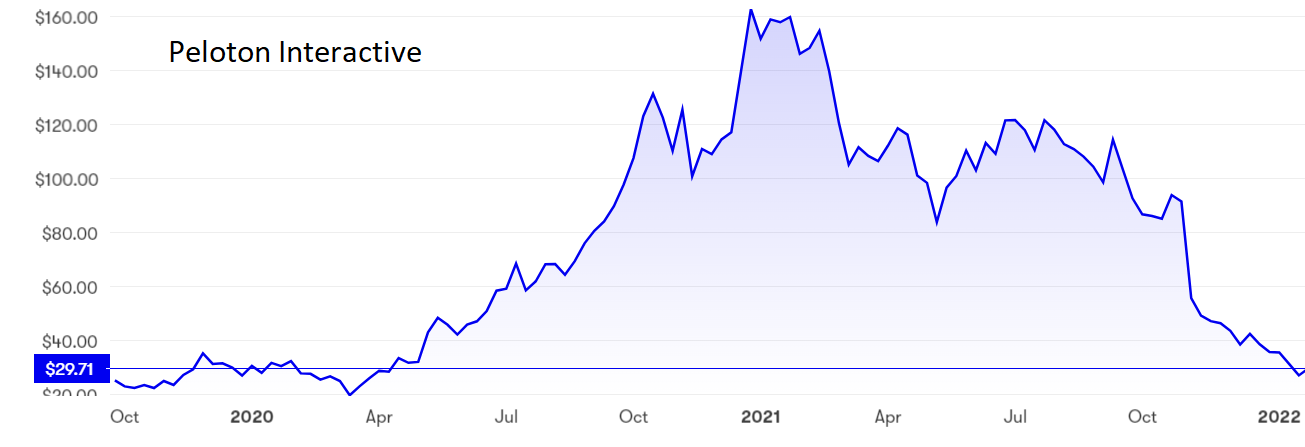The stocks to pick in a market crash
26th January 2022 09:08
by Rodney Hobson from interactive investor
It’s hard to identify which companies to invest in when sentiment turns sour. To help, our overseas investing expert explains how he does it and what you should do with these big-name stocks.

Rodney Hobson is an experienced financial writer and commentator who has held senior editorial positions on publications and websites in the UK and Asia, including Business News Editor on The Times and Editor of Shares magazine. He speaks at investment shows, including the London Investor Show, and on cruise ships. His investment books include Shares Made Simple, the best-selling beginner's guide to the stock market. He is qualified as a representative under the Financial Services Act.
Tech stocks have ruled the roost during the pandemic as more traditional companies have struggled with lockdowns and disruptions. That looks to be changing dramatically as investors rotate back into so-called value stocks. Momentum can be very important in assessing which sectors to pick.
With central banks, particularly the Federal Reserve Bank in the United States, set to raise interest rates and dampen inflationary economic growth, investors are wisely looking for companies that produce earnings and generate cash now rather than take a chance on more speculative stocks that could deliver more in the future.
- Invest with ii: Top US Stocks | US Earnings Season | Super 60 Investment Ideas
In particular, they are trying to spot profitable companies whose shares have been left behind in the bull market. While all shares are likely to suffer in a prolonged period of rising interest rates, these defensive stocks tend to come through relatively unscathed.
- Market snapshot: why today will be hugely significant for share prices
- Is it game over for tech shares?
- Twitchy times as US earnings season kicks off
- Watch our share, fund and trust tips, plus outlook videos for 2022
The tech-heavy Nasdaq Composite Index looked unstoppable as it climbed steadily from 6,600 points two year ago to topside of 16,000 towards the end of last year, a gain of more than 140%. Expectations became overblown, so any missed profit forecasts now have an equally exaggerated impact on share prices.
The index has fallen about 15% from the peak, well above the 10% that is generally regarded as constituting a “correction”. This suggests that the decline is much more than a settling back before the next bull phase gets going. At this rate, 11,000 points beckons. So far this year the Nasdaq Composite has the unhappy distinction of being the second-worst performing major index after the Russian stock market, which has been heavily battered by fears over a possible conflict in Ukraine.
In contrast, the Dow Jones Industrial Average comprising less exciting stocks rose from 19,000 points to 36,000 over the same period, a gain of 90%. The fall since has been only 5%.
This is not, however, a repeat of the tech bubble around the millennium. Tech stocks then were even more overhyped and many companies then had little or no revenue, let alone profits. This correction will be less dire.
Muddying the waters further is the idea is that the end of the easing of Covid restrictions will encourage people to return to something like normal, and that activities such as eating at home and binge-watching television series will begin to look boring.
- Baillie Gifford gives its opinion on the US tech crash
- Chart of the week: tech stocks and what to make of the crash
- US stock market outlook 2022: more record highs for Wall Street?
- Want to buy and sell international shares? It’s easy to do. Here’s how
That view was reinforced when video streaming service Netflix (NASDAQ:NFLX) reported that it had added 8.28 million new subscribers in the final three months of 2021, taking the total of paying subscribers to 222 million.
As Keith Bowman reported ii view: Netflix shares plunge after Q4 results , the results were not bad, it was just that expectations had mounted during the pandemic and investors had come to price massive growth into the share price. Less strong growth that would nevertheless be highly welcome among value stocks is no longer good enough for the likes of Netflix, which has warned of a further slowdown in subscriber numbers in the current quarter.

Source: interactive investor. Past performance is no guide to future performance
Some well entrenched companies such as Microsoft (NASDAQ:MSFT) are protected by the prohibitive entry costs that are a barrier to would-be disruptive competitors, but Netflix is among those facing intense and growing competition. Amazon’s (NASDAQ:AMZN) Prime, Apple (NASDAQ:AAPL) TV and Walt Disney (NYSE:DIS) all offer rival television services while having the advantage of enjoying a range of alternative sources of revenue.
Subscribers can shop around for deals that drive down the price of services and make Netflix reliant on rivals offering to include it in a cut-price bundle of wider services.
- ii view: Netflix shares plunge after Q4 results
- Friends & Family: ii customers can give up to 5 people a free subscription to ii, for just £5 a month extra. Learn more
- Take control of your retirement planning with our award-winning, low-cost Self-Invested Personal Pension (SIPP)
Netflix shares were trading below $150 at the start of 2017 and peaked at $690 in October last year. Over the past three weeks they have slumped nearly 50% to around $370. Even so, they still stand on a rating of 35 times earnings, which is quite demanding for a company that does not pay a dividend.
It is not just tech stocks that are vulnerable to an adverse stock market swing post-pandemic. Exercise bicycles and treadmills maker Peloton Interactive (NASDAQ:PTON) admitted in November that sales had slowed more sharply than expected, and it pulled forward second-quarter results to halt a slide in the share price caused by unfounded fears that the company would halt all production.

Source: interactive investor. Past performance is no guide to future performance
Revenue of $1.14 billion came in the middle of the range projected in previous guidance, and Peloton suggested that losses for the full year would be better than expected. Even so, a projected deficit of $260-270 million is hardly encouraging and means there is no realistic prospect of a dividend. If you cannot make a profit in the good times, how will you fare when the going gets tough?
Hobson’s choice: I prefer to rely on fundamentals such as revenue, profits and dividends, especially as judged in the context of yields, pre-earnings ratios and dividend cover in choosing companies to buy. But, in the short term, share price trends can be more important. At the moment investors should be looking for companies that have been unfairly dragged down by the general stock market fall, companies that will be the first to bounce back as fundamentals prevail over short-term swings.
Meanwhile, sell Peloton and Netflix. There are better prospects elsewhere.
Rodney Hobson is a freelance contributor and not a direct employee of interactive investor.
These articles are provided for information purposes only. Occasionally, an opinion about whether to buy or sell a specific investment may be provided by third parties. The content is not intended to be a personal recommendation to buy or sell any financial instrument or product, or to adopt any investment strategy as it is not provided based on an assessment of your investing knowledge and experience, your financial situation or your investment objectives. The value of your investments, and the income derived from them, may go down as well as up. You may not get back all the money that you invest. The investments referred to in this article may not be suitable for all investors, and if in doubt, an investor should seek advice from a qualified investment adviser.
Full performance can be found on the company or index summary page on the interactive investor website. Simply click on the company's or index name highlighted in the article.
Disclosure
We use a combination of fundamental and technical analysis in forming our view as to the valuation and prospects of an investment. Where relevant we have set out those particular matters we think are important in the above article, but further detail can be found here.
Please note that our article on this investment should not be considered to be a regular publication.
Details of all recommendations issued by ii during the previous 12-month period can be found here.
ii adheres to a strict code of conduct. Contributors may hold shares or have other interests in companies included in these portfolios, which could create a conflict of interests. Contributors intending to write about any financial instruments in which they have an interest are required to disclose such interest to ii and in the article itself. ii will at all times consider whether such interest impairs the objectivity of the recommendation.
In addition, individuals involved in the production of investment articles are subject to a personal account dealing restriction, which prevents them from placing a transaction in the specified instrument(s) for a period before and for five working days after such publication. This is to avoid personal interests conflicting with the interests of the recipients of those investment articles.